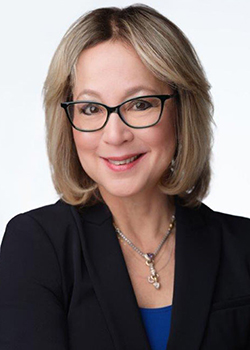Women in Security Feature: Tara Dunning

By Cory Harris, Editor
Updated 7:54 AM CST, Tue November 15, 2022
 YARMOUTH, Maine—As part of Security Systems News’ and the Security Industry Association (SIA) Women in Security Forum’s (WISF’s) continuing series highlighting the contributions of women in security, this month’s feature is on Tara Dunning, Vice President, Global Security at Wesco International - a global supply chain solutions provider - who is based out of Washington, D.C., and Chicago.
YARMOUTH, Maine—As part of Security Systems News’ and the Security Industry Association (SIA) Women in Security Forum’s (WISF’s) continuing series highlighting the contributions of women in security, this month’s feature is on Tara Dunning, Vice President, Global Security at Wesco International - a global supply chain solutions provider - who is based out of Washington, D.C., and Chicago.
A seasoned global sales transformation executive, Dunning has a history of leading and developing high-performing teams to generate top-line growth. She is on the Security Industry Association (SIA) Member Executive Advisory Board and has been actively involved in various women’s and multi-cultural organizations over the last 15 years. Dunning told SSN that her responsibilities include “leading a global security solutions sales team to drive go-to-market transformation, while also enabling our broader ecosystem of partners to prepare for and leverage a digitally transformed future.”
The following is an exclusive Q&A with Dunning:
SSN: How did you get into and what inspired you to stay in the security industry?
Dunning: The security industry is going through rapid transformation and extraordinary growth at the same time. Most of my career has been spent in transformation roles in an industry experiencing disruption and/or significant change. And while my career has generally been focused on IT and communications technology, network and cybersecurity were always a critical part of any solution stack we provided to a customer. With the convergence of information and operational technology, I wanted to join an organization that had world-class partners in the physical security space, while also offering broader network, broadband and infrastructure solutions. In addition to Wesco’s global scale and robust supply chain solutions, the company’s culture and team dynamics are a great match and fit for me.
SSN: What has your journey been like in a primarily male-dominated and historically non-diverse security industry?
Dunning: Historically, the security industry is not unlike the IT and communications industry with respect to diversity. According to the U.S. Census Bureau, women are nearly half the U.S. workforce, but less than a third are STEM workers. Security professionals are part of a multi-cultural workforce, and it is one of the fastest growing professional careers globally.
A big reason I was attracted to Wesco is the company’s focus on inclusion and diversity, its broad and active business resource groups, and the steps it is taking to address representation gaps. In the end, you need to work with the right organization that is a cultural fit for you and that mirrors your own values.
SSN: What have you found most challenging working in the security industry and how did you overcome it?
Dunning: The security industry itself is large and complex, and at Wesco, the opportunities and challenges are no different. Physical security has evolved from traditional guarding solutions to electronic security and network-based solutions, leveraging adjacent technology on the smart edge. When you are dealing with the breadth and complexity of unique products from fire and intrusion to video surveillance, access control, and software services leveraging analytics and AI, there is no “one size fits all” from a go-to-market perspective. These solutions require deep specializations, and the nuances by customer segments and geographies are significant. The key to overcoming the complexity challenge is to understand the end-customer needs, surround yourself with great people, never stop learning (especially as technology is rapidly ever-changing), and ensure you have the right partners to strengthen your solution offerings.
SSN: Have you had any role models who have helped you out along the way that you would like to mention?
Dunning: I’ve had the benefit of having many mentors and role models in my career journey. At a fundamental level, those who have had the greatest impact on me have these traits in common: humility, open mindedness, and unfaltering intellectual curiosity. I have found these same individuals demonstrate resilience in the face of adversity, showed courage by going against the grain, and were true agents of change – meaning they were deft in their ability to lean into what may be disruptive in the short term, but understood that it led to improvement and increased opportunity in the long term. I believe the best leaders have mastered the art of influencing through others, have built trust among a large community and naturally have extraordinary followership.
SSN: What advice would you give other women thinking about getting into the industry or just starting out in the industry?
Dunning: Every interaction is an opportunity to learn and grow. Develop the habit to continuously network and building meaningful connections. Get involved in communities, associations, resource groups, and educational forums. Really dig into what you want in a career now and longer term but be open to that changing. Know and stay true to your values, but more importantly, understand what really inspires and motivates you – what lights a fire.
The security industry needs new talent, and the industry is rapidly growing. It touches all verticals and crosses over all segments. It’s an evolving industry from a technology perspective, and there are roles at technology providers, systems integrators, managed service and solution providers and distributors.
SSN: What are your views on the industry moving forward, both from a diversity perspective and a technology and business perspective during these unpredictable times?
Dunning: There is and likely will always be opportunities to improve as an industry from a representation perspective. Our industry is a global one, and it should be reflective of the diverse fabric of multi-national customers, partners, and the communities where we live and work. Times can be unpredictable, whether it be worker health and safety, supply chain constraints, inflation or the strengths or weaknesses of different currencies, but from my perspective the industry is strong, and its relevance is only growing. While there is industry consolidation, there is also industry expansion of new entrants, and technology is evolving at breakneck speed. With evolution and growth, there is always change. There is a great opportunity for new talent to enter, be a part of something bigger and participate in an exciting and still-being-defined future for our industry.
SSN: What do you feel are the top trends, issues or challenges facing the security industry today?
Dunning: Digitalization is accelerating, and the demands of the security business are growing. We need to think more broadly about security, and there is great opportunity to expand your business by doing so. For example, the video surveillance camera is becoming the ultimate sensor for a digitally connected world, with its computing power and the opportunity to provide meaningful outcomes for business challenges. While surveillance has always been thought of in terms of intrusion, loss and threat detection, customers are now looking to leverage analytics from cameras and connected edge devices to address safety, compliance, and even operational efficiencies and ways to maximize revenue. Customers want different business models as well and want to buy differently than they have before. I see a shift toward cloud-based and as-a-service models gaining traction in our space.
Comments